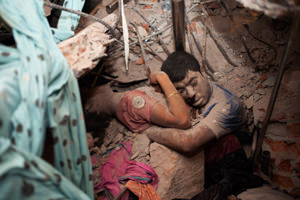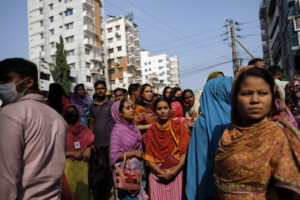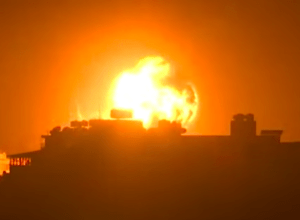Wal-Mart’s Bangladeshi Garment Factories Are Failing Inspections
Safety reviews, ordered by Wal-Mart in the wake of the tragic Rana Plaza collapse in the spring, have proven that at least 10 of the company's 75 garment factories audited so far in the country were not fit for employees to work in. The retail giant uses about 200 factories in Bangladesh, cashing in on the nation's cheap labor and dismal working conditions.
Safety reviews, ordered by Wal-Mart in the wake of the Rana Plaza collapse in the spring, have proven that at least 10 of the company’s 75 garment factories audited so far in the country were not fit for employees to work in without severe risks to their well-being.
The eight-story building located in Dhaka, the capital of Bangladesh, caved in on April 24, killing more than 1,100 people and injuring thousands more. The tragedy brought to light the dismal environment workers endure in the Bangladeshi garment industry, as well as caused many global brands to fall under scrutiny for selling clothing fabricated in the Asian nation.
Wal-Mart, among other international brand names, uses about 200 factories in Bangladesh, cashing in on some of the world’s lowest wages and below-standard factory conditions. The Guardian reports:
…Walmart said it will release results for other factories as the inspections are completed.
It said factories that failed audits have since made improvements.
In the aftermath of the Rana Plaza disaster, major European clothing retailers signed up to a system of factory inspections in conjunction with labor and activist groups.
North American retailers set up a separate alliance and established a fund that could be tapped for factory improvements….
Bangladeshi garment makers employ millions of people, mostly women, but safety has been an afterthought amid pressure to fill orders, while enforcement of labor rights and building safety codes is compromised by corruption and thin government resources.
Workers took to the streets in September to protest factory owners’ refusal to raise the inhumanely low wages. The four-day demonstrations led to several factory shutdowns and violence. Since many of the garment industry businessmen form part of the ruling government’s party in Bangladesh, Prime Minister Sheikh Hasina was able to persuade her fellow politicians to raise the minimum wage by a whopping 77 percent, a boost that went into effect last week. Although the increase is an immense improvement, it still allots only 5,300 takas ($66) per month for new employees.
—Posted by Natasha Hakimi
Your support matters…Independent journalism is under threat and overshadowed by heavily funded mainstream media.
You can help level the playing field. Become a member.
Your tax-deductible contribution keeps us digging beneath the headlines to give you thought-provoking, investigative reporting and analysis that unearths what's really happening- without compromise.
Give today to support our courageous, independent journalists.





You need to be a supporter to comment.
There are currently no responses to this article.
Be the first to respond.